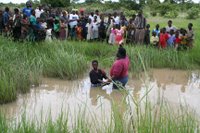
Our Christmas was certainly different this year. We were up early, as usual, and were able to talk to both our children on the internet (Skype). They were spending Christmas Eve with my brother’s family in Monett, Missouri. (Zambia is eight hours ahead of CDT.)
At 8:00 we left for our outreach, taking eight Zambians along with us. We arrived at Gowell (pronounced go well) and found Patson Syula just finishing up preparations for the day. The congregation at Gowell has only a handful of members, but they had invited the entire community for an all-day Christmas gathering. Patson, a member of Namwianga’s Church Development Team, had organized the event. He had spent the weekend at Gowell helping them get a thatched roof shelter made and arranging the food for the guests he hoped would come. He had just finished work on the shelter that morning and had added posters and balloons as decorations.
People trickled in all morning as we had singing, preaching, teaching, and communion. My translator, Sylvester, helped me teach the 38 children who came for Bible class. David preached the morning sermon, and others took their turns to teach and preach as well. The meal was to be the last event of the day, and we could see some young men doing the preparations nearby. During a break we went over and helped stir the nshima as it cooked in a huge iron pot over the open fire. The afternoon continued with some special singing groups as well as congregational singing and more preaching. The people kept coming, adding more to the 93 who were present for the morning service. Finally at 4:00 the food was ready. We feasted on nshima, chicken, and goat meat.
We arrived back home at 6:00. We pulled out the Dr. Pepper and the new DVDs that we had been saving for the occasion. Our congregation at Brentwood Oaks had sent us a wonderful care package of goodies with the Americans who came in early December. It is amazing how good a Dr. Pepper tastes when you haven’t had one for six months! We enjoyed a nice, quiet evening of watching movies and drinking Dr. Pepper.
There are all kinds of ways to celebrate Christmas. We consider ourselves blessed to have shared this one in Africa as we serve our Lord.






